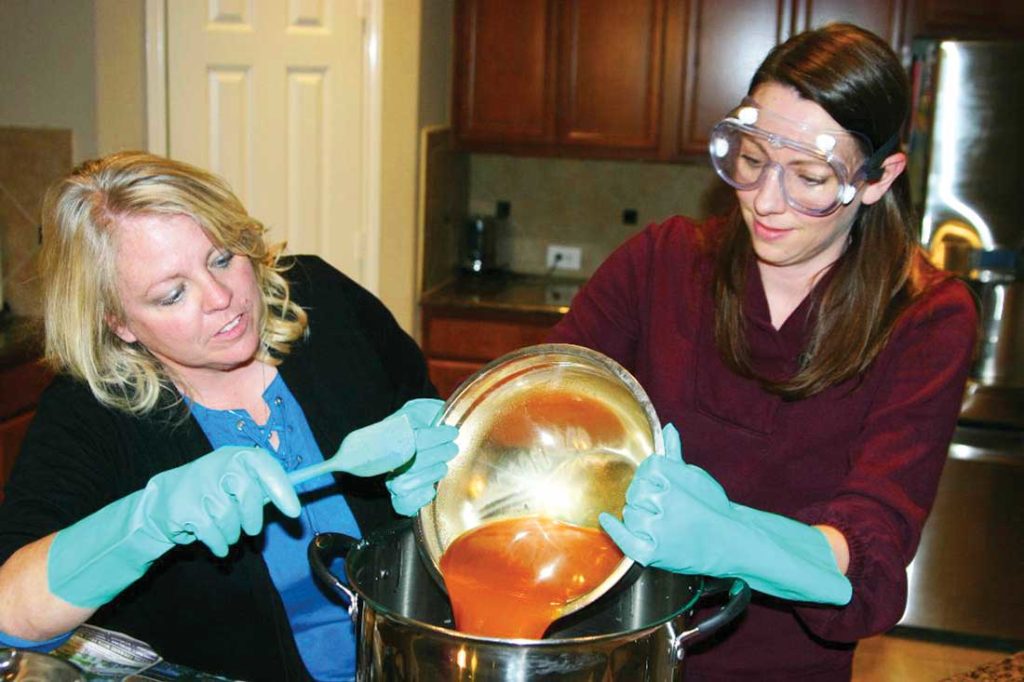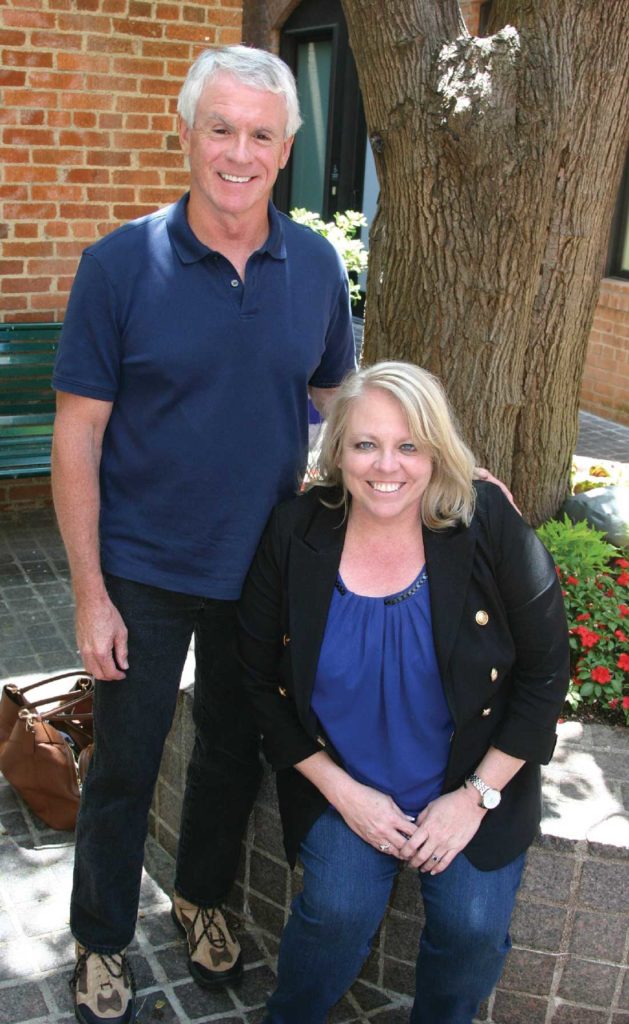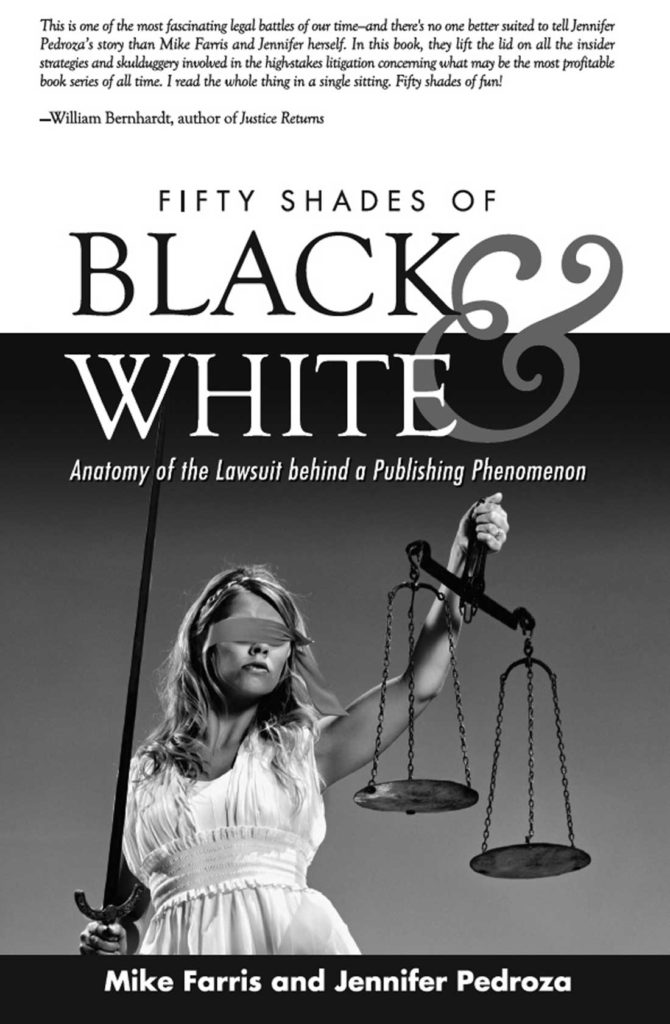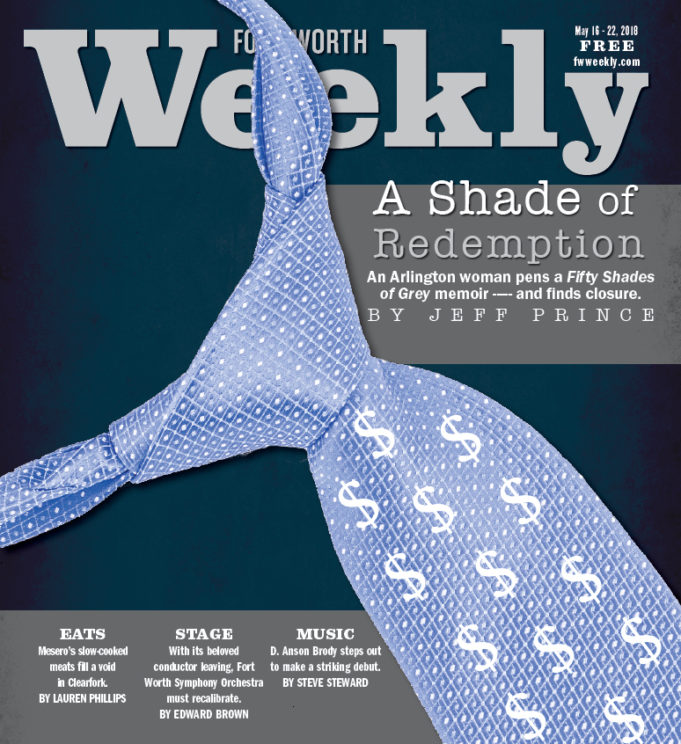The receptionist left a handwritten message on my desk recently asking me to call Jennifer Pedroza. Something about a soap opera.
What the?
I googled the name.
Ah, yes. Pedroza. The Arlington woman who published Fifty Shades of Grey but was cheated out of millions of dollars by one of her business partners. I had written a cover story about her back in 2014 (“Soap Opera,” Jan. 29).
My memory of receiving the story assignment is fuzzy, but it went something like this.
EDITOR: “Hey, here’s a possible story I heard from a friend. A couple of women in Arlington started a home-based business making soap and selling it online.”
ME: “Stop the presses.”
EDITOR: “Wait …”
ME: “I smell a Pulitzer.”
EDITOR: “Do you want to hear this or not?”
ME: “Well …”
EDITOR: “The women were also involved in publishing Fifty Shades of Grey but were cut out of the profits. Might make an interesting story.”
Talk about burying the lede.
I hadn’t read Fifty Shades of Grey, but I knew plenty of it, thanks to pop culture osmosis – myriad references on late-night shows and punch lines to bad jokes made the literary phenomenon impossible to escape. The erotic romance book was published online in 2011. Second and third installments appeared in 2011 and 2012. The trilogy would go on to sell more than 150 million copies worldwide.
Random House took over publishing duties in 2012. Prior to that, a little publisher known as the Writer’s Coffee Shop owned the rights. Pedroza, along with friends and relatives, had scrambled to box up books and fill orders from her home while Fifty Shades was becoming a best-seller.
In 2010, Pedroza had co-founded Writer’s Coffee Shop with another Texas woman and two Australian residents. Their long-distance partnership was initially bonded over a shared love of fan fiction. But with Grey’s success, one of the Australian partners, Amanda Hayward, restructured the company as a sole proprietorship and defrauded her partners after selling the publishing rights to Random House in 2012.
Pedroza was stunned. She had quit her job as an elementary school teacher, and she had convinced a friend, Christa Beebe, to quit her teaching job as well to work at the new business.
After being pushed out of the company, Pedroza and Beebe turned to making soap. The drop-off in excitement and income from publishing one of history’s best-selling books to melting scented ingredients in pots and filling molds was severe.

Still, both women were upbeat and friendly when I knocked on Pedroza’s front door in January 2014. After talking with the women awhile, I saw glimpses of their shell-shocked disbelief creeping through. The school year had already begun, and neither could find permanent teaching positions. They were trying to make lemonade out of rotted lemon peels and expressed gratitude about having their soap venture featured in a newspaper story. Pedroza, though, asked for the article to downplay the bad business deal that left her busted while her Australian-based partner was pocketing fistfuls of money. Pedroza was embarrassed about being bamboozled. And she appeared to kowtow to Hayward and was worried about being sued.
I marveled at Pedroza’s stoicism.
My story appeared, and none of us could have predicted what happened next. A cease and desist order. Lawsuit. Verdict. Settlement. Redemption. And a new book that’s being released this week: Fifty Shades of Black & White: Anatomy of the Lawsuit behind a Publishing Phenomenon.
Pedroza has spent much of her adult life working as a public-school teacher. Her book about betrayal and fighting back is another lesson to impart.
“I hope people can learn from my mistakes,” Pedroza said.
*****
Several years had passed since I spent that afternoon in Arlington documenting Pedroza’s soapmaking skills and discovering how she was screwed out of a fortune. And, now, there she was, sitting on the back patio at Riscky’s BBQ in downtown Fort Worth on an April afternoon.

Sitting with her was retired attorney and published author Mike Farris, who had represented Pedroza in her lawsuit against Hayward. In 2015, a Tarrant County jury determined Hayward had defrauded Pedroza, who was awarded $13 million the following year by a district judge. She settled for an undisclosed but presumably lesser amount to avoid a lengthy appeal.
I have found no evidence online of Hayward commenting on the trial or its outcome, although the Fort Worth Star-Telegram quoted Hayward’s attorney, who said, “It is a good settlement from both parties’ standpoint.”
Since we last met, Pedroza had completed work on her second master’s degree and begun working as an instructional specialist at Sam Rosen Elementary School on the North Side. She and Farris, who co-authored Fifty Shades of Black & White, are promoting their book by word of mouth. They are sending press releases and e-books to news media outlets and talk shows, spotlighting the book on Farris’ website, and selling it on the publisher’s site and on Amazon and other online retailers. Released by Stairway Press and available online now in e-book or paperback, Fifty Shades of Black & White is the first in-depth examination of the trial and is a fun read.
The lawsuit, settlement, and book would probably not have happened if not for me showing up on Pedroza’s doorstep in 2014, she said.
“The article in the Fort Worth Weekly kind of started it all,” she said. “You were a big part of that process.”
Well, shucks. I was just doing my job, ma’am.
The co-authors write in alternating chapters, with Farris focusing more on the legal maneuverings and courtroom drama and Pedroza describing the emotional whirlwind that she and her family endured. The distinct styles and approaches balance each other well, and the book is interesting and exciting.
Farris retired after the trial, making the Fifty Shades lawsuit his last. The longtime entertainment attorney from Dallas doesn’t write in a legalese manner so common among lawyers. He sports a keen knack for storytelling, and his chapters provide the book’s foundation. A complicated case became a simple but gripping morality tale in his hands.
“Anything he writes, any legal documents or anything, are written in a way that tells a story,” Pedroza said. “It’s written in a way people can understand. When we first did the lawsuit, it was something I could read through” and understand.
She wasn’t surprised to learn he had written numerous books over the years in various genres while also working as a lawyer. Now that Farris is retired from law, his business card describes him as “writer” and nothing more.
“My biggest concern was getting all the law stuff and the procedure in” Fifty Shades of Black & White but in a way that wouldn’t bore a “lay person,” he said. “I was trying to walk a fine line of making the reader understand what was happening and what it was all about but also feeling the human side.”
A willingness to share the fears that are playing out in his mind – his human-ness – helps make the storytelling effective. It’s there when Farris is about to rise and make an opening statement to 12 jurors at the trial.
Perspiration coated my forehead, and a drop of sweat trickled down my side. I knew it would soon soak through the fabric of my suit coat and betray my anxiety. My hands tingled down to the tips of my fingers. Part of me wanted to flee, but the better part kept me in place. I had to stay because I had a duty to speak. I had a story to tell. It had characters, and it had a plot. It was, at its heart, a simple story: Four women partnered together to publish one of the most successful book series of all time, but one of the partners absconded with the profits.
Pedroza, a wife and mother with her own knack for storytelling, wrote her chapters during her spring break from teaching last year.
“I said, ‘I’m not moving from this computer until it’s knocked out and done,’ ” she recalled.

She wasn’t afraid of making herself look naïve, such as describing how, before meeting Farris, she didn’t know that lawyers specialized in certain fields or that they sometimes worked on contingency – toiling with little upfront money and gambling on being paid at the end of a successful trial.
Farris, a slender, middle-aged man with a full head of gray hair, gambled plenty by agreeing to represent Pedroza on contingency – something Pedroza didn’t fully comprehend until she read the book.
“That was an eye-opener for me,” she said. “I didn’t know how much he had gone to bat for me with his law firm. There was a lot at stake.”
Simultaneously, Farris was battling Guillain-Barre syndrome, a rare autoimmune disorder that affects about 1 in 100,000 people each year. Symptoms include weakness, numbness, and tingling in extremities. Farris and fellow attorney Brent Turman put in many long hours handling a case that spanned two continents.
“It was a significant expenditure,” Farris said. “I had about 1,300 hours in the case, and Brent had 800. That’s 2,100 attorney hours that we weren’t billing clients.”
Pedroza figured Hayward attempted to withhold payments and royalties because Pedroza didn’t have much money for a court battle and hadn’t shown herself to be particularly aggressive or demanding.
“She didn’t count on my finding a white knight,” Pedroza said, nodding at Farris across the table at Riscky’s.
*****
Farris was clearly the white knight coming to Pedroza’s rescue, but she credits Fort Worth Weekly for its supporting role. That day I met Pedroza and her employee, Beebe, in 2014, I was amazed at how bullied and anxious they seemed
I had spent several hours searching online for information related to the book and its players. I found old Writer’s Coffee Shop press releases that referred to the founding of the company by four women, and Hayward had given interviews to Australian-based media outlets a couple of years earlier. She rarely shared credit in the articles, but, in one, she referred to a “U.S. partner.” Few details had been given to Pedroza about the Random House deal, but Hayward spoke in articles about a $1 million payment and royalties.
Pedroza’s description of our meeting provides insight into her emotional state at the time.
We still needed exposure for our fledgling company, so when Fort Worth Weekly’s Jeff Prince asked to interview us for a story about how we went from teachers to soap-makers, Christa and I thought it would be great free advertising. Fort Worth Weekly was not a large publication, boasting a circulation of only about 75,000 people in the Dallas-Fort Worth area, but we thought the article would target our geographic market. We didn’t have ulterior motives or grand schemes of vengeance against Amanda, but we wanted to get our company into the public eye.
So, we sat down with Jeff Prince for the interview, but the more we talked, and the more Jeff revealed what he already knew from his own research, the more worried we became. It was as if he were shining a light on all the dark details of what had transpired over the last couple of years, and it illuminated some difficult memories. I also worried about what Amanda, who could be vindictive, might do when the article was released.
Pedroza expressed her concerns with her husband, Mickey Pedroza, and called me in a worried state not long after our interview:
Mickey suggested I call Jeff and see how he was going to spin the article, which I did. He was a very nice man, listening patiently as I had a mini-breakdown on the phone. When I finished telling him my concerns about retaliation, he said, “Man, this almost sounds like an abusive relationship.”
That statement brought me to my knees. Here was a man who knew only what he had found on the internet about the publication of Fifty Shades of Grey, plus what I had told him about my time with the publishing house, and even he saw right through the dysfunctional relationship I had been blind to. I didn’t know if our conversation caused him to change anything in his article, but he assured me he would post only facts he had found on his own, plus my feelings on my tenure and release from the company. He, of course, didn’t have a crystal ball, but he would do his best to write the story as innocuously as he could.
Well, darned if Mickey wasn’t right. Not 24 hours after the article, called “Soap Opera,” hit the internet, I received a threatening cease-and-desist letter.
Hayward’s attorney was demanding that Pedroza and Beebe shut their pie holes. A nervous Pedroza looked around for an attorney and, on the advice of a friend, found herself in Farris’ Dallas office. He read the Weekly article, looked at Hayward’s threatening letter, and decided the Australian woman was a bully who had illegally defrauded Pedroza. The long court battle, Farris’ willingness to work on contingency, and his and Pedroza’s time spent co-writing their book made them fast friends.
“I wanted to be able to tell my side of the story,” Pedroza said. Farris “was always a realist. He would always say there is a possibility we might not win. I just automatically assumed that if you tell the truth, you’re going to win.”
Any lawyer will tell you that the truth doesn’t guarantee wins or set you free, but Pedroza counted on karma and fate in equal parts.
“It was just meant to be,” she said. “Everything, from meeting Mike Farris to the cease-and-desist to your article, all these things lined up.”
Contact Jeff Prince at jeff.prince@fwweekly.com.













Great! So glad you are that kind of guy.
gosh-oh-mighty…ain’t that something ?
Way to go, Jeff, Jennifer, and Mike. Why don’t you take on the NRA next?